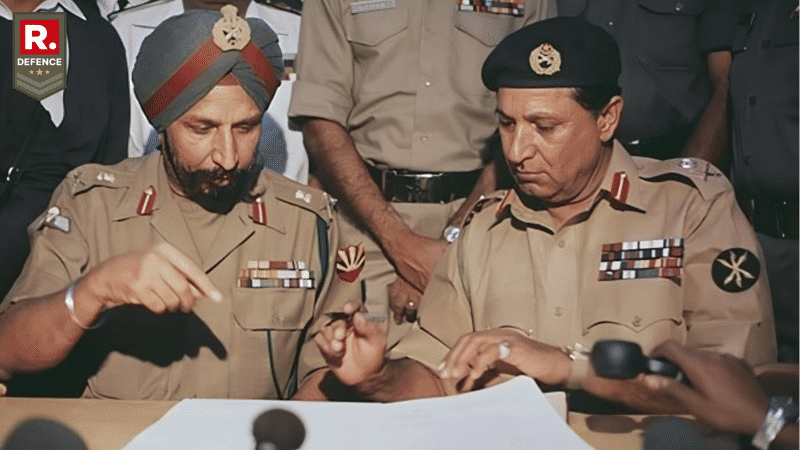Published 16:48 IST, December 16th 2024
How Pakistan’s Brutality in 1971 Led to the Birth of Bangladesh and the Largest Surrender Since WWII
The war birthed Bangladesh, a testament to the resilience of its people. For Pakistan, it remains a grim lesson in the cost of oppression.

New Delhi, India - The Bangladesh Liberation War of 1971 remains one of the darkest chapters in modern history, not just for the atrocities committed but also for the inspiring resilience of the Bengali people who rose against oppression. Triggered by decades of political and economic exploitation by West Pakistan, the war culminated in the creation of Bangladesh, marking a monumental defeat for Pakistan’s military junta.
The seeds of conflict were sown long before 1971, with East Pakistan (now Bangladesh) treated as a colony by West Pakistan. Despite being the more populous region, East Pakistan was denied political power, economic resources, and cultural respect. Matters reached a boiling point after the 1970 general elections, where Sheikh Mujibur Rahman’s Awami League won a decisive majority, only to have its mandate dismissed by Pakistan’s ruling elite.
Pakistan’s Genocidal Campaign: A Tragic Beginning
When peaceful protests and negotiations failed, the Pakistani military unleashed Operation Searchlight on March 25, 1971. What followed was nothing short of a genocide. Under orders from General Yahya Khan, Pakistani troops systematically targeted Bengali civilians, intellectuals, and students, killing thousands in the first few days alone.
Villages were torched, women were subjected to horrific sexual violence, and an entire population was forced into submission. The world watched in muted horror as the atrocities unfolded, with some estimates putting the death toll at over three million.
The Mukti Bahini: Defiance in the Face of Oppression
The brutality of the Pakistani Army gave rise to the Mukti Bahini, a guerrilla force formed by Bengali soldiers, paramilitary personnel, and civilians. Despite being outgunned and outnumbered, these freedom fighters waged an unrelenting battle against the occupying forces. Their ingenuity was on full display during Operation Jackpot, where they crippled Pakistan’s naval capabilities, proving that resilience could defeat tyranny.

The Pakistani response? Even more violence. Instead of addressing the legitimate grievances of its eastern populace, Pakistan chose to brand them as traitors and relied on paramilitary groups like the Razakars and Al-Badrs, who were notorious for their cruelty. These collaborators turned on their fellow Bengalis, adding another layer of tragedy to an already devastating conflict.
India Steps In: Turning the Tide
As millions of refugees poured into India, fleeing Pakistan’s reign of terror, it became clear that the crisis could not be ignored. Prime Minister Indira Gandhi, faced with an unprecedented humanitarian disaster, chose to intervene. India’s support for the Mukti Bahini was not only strategic but also moral—a stance against the genocidal policies of Pakistan’s rulers. Furthermore, Prime Minister Indira Gandhi noted that instead of allowing millions of refugees, India would be economically better off going to war with Pakistan.
On December 3, 1971, Pakistan escalated the conflict by launching preemptive airstrikes on Indian airbases. The move, reminiscent of a gambler’s last desperate bet, backfired spectacularly. India responded with overwhelming force, engaging in a two-front war that showcased the sheer incompetence of Pakistan’s military leadership.
Indian forces, alongside Mukti Bahini fighters, dismantled Pakistan’s defences in East Pakistan with surgical precision. By December 16, Dhaka fell, and Lt. Gen. A.A.K. Niazi of the Pakistan Army signed the Instrument of Surrender, handing over 93,000 troops. It was the largest surrender since World War II—a humiliating defeat that exposed Pakistan’s arrogance and ineptitude.
Pakistan’s Failure: A Study in Mismanagement and Hubris
Pakistan’s actions during the Bangladesh Liberation War were not just brutal; they were astoundingly short-sighted. The military regime, drunk on power, failed to recognize the inevitability of East Pakistan’s demand for autonomy. Instead of political dialogue, it chose a path of violence, alienating an entire population and isolating itself on the world stage.

Even as the war reached its climax, Pakistan clung to delusions of victory. Its strategy was laughably ineffective—deploying troops in small, scattered units that were easily overwhelmed by the combined might of Indian forces and Mukti Bahini fighters. The government’s propaganda machine churned out hollow boasts of triumph while its soldiers faced the stark reality of defeat.
A Nation Born of Sacrifice
The creation of Bangladesh was a monumental achievement, symbolizing the triumph of justice over oppression. For the people of East Pakistan, independence was not just a political victory but a moral one—a testament to their unyielding spirit in the face of unimaginable suffering.
For Pakistan, however, the war was a lesson in the consequences of hubris and inhumanity. Its military and political leadership not only failed to hold the country together but also stained its history with the blood of innocents. Decades later, the scars of 1971 remain a haunting reminder of how the arrogance of power can lead to catastrophic failure.

The Bangladesh Liberation War is a story of courage, resilience, and the enduring quest for freedom. It is also a damning indictment of Pakistan’s oppressive policies, which turned its citizens into enemies. As Bangladesh continues to flourish as an independent nation, Pakistan is left to grapple with the legacy of its actions—a legacy of failure, brutality, and betrayal. For the world, 1971 is a powerful reminder that the will of the people cannot be crushed, no matter how brutal the oppressor. Justice may be delayed, but it is never denied.
Updated 16:48 IST, December 16th 2024




